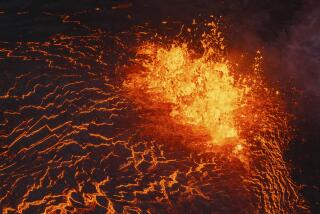Volcano in Caribbean Erupts Again
- Share via
PLYMOUTH, Montserrat — A reawakened volcano sprayed tons of ash miles into the air on Saturday, forcing out residents who had tried to return to retrieve belongings abandoned after an earlier eruption.
Authorities had already evacuated about 5,000 residents from the southern third of this small Caribbean island on Wednesday, when an eruption sent ash more than 6,000 feet into the air and molten rock began flowing at the crater of the Soufriere Hills volcano.
Saturday’s eruption was bigger, creating a billowing gray cloud that rose nearly four miles high over the British colony.
The eruption, which followed a series of smaller ash clouds Saturday, lasted up to 15 minutes.
Viewed from several miles away, the top of the 3,000-foot volcano quickly vanished behind the cloud, and wind-borne ash reduced visibility to several hundred yards. What was a sunny day became overcast.
Scientists at the Montserrat Volcano Observatory called it “the first real volcanic eruption yet.”
“We’re looking at a big vertical explosion, probably the first of many,” said Dr. John Shepherd, a British Geological Survey scientist attached to the MVO and an expert on Caribbean volcanoes.
As he talked, a seismograph’s needles, measuring movement on the mountain, went off the scale and mushroom clouds pushed higher into the skies.
Police Commissioner Frank Hooper immediately ordered officers to stop issuing passes to residents of Plymouth, the capital, and nearby areas. The passes had allowed people to return to their homes to recover items left behind in Wednesday’s hasty evacuation.
Before the eruption, a few of Plymouth’s 3,000 residents had donned face masks and braved stinging ash to retrieve their belongings.
An estimated 1,200 people were in shelters in the north, Hooper said. Most of the others were staying with friends or family. Only about 250 people left the island.
It was the third evacuation since the volcano awakened in July after hundreds of years in dormancy.
More to Read
Sign up for Essential California
The most important California stories and recommendations in your inbox every morning.
You may occasionally receive promotional content from the Los Angeles Times.













